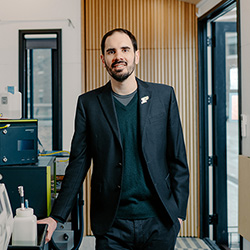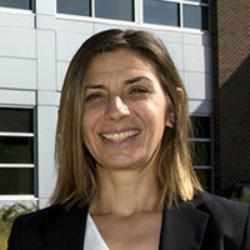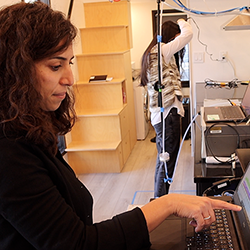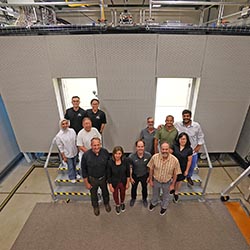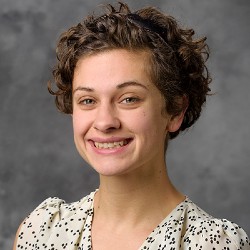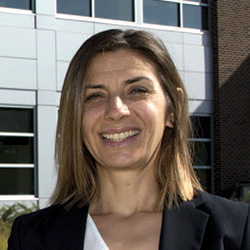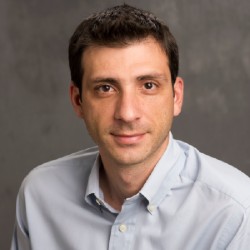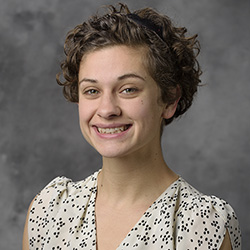Architectural Engineering
Architectural Engineering (ArchE) deals with integrated design, construction and operation of buildings. It includes all engineering aspects related to the built environment: building envelope, mechanical systems (HVAC), electrical systems, lighting systems, construction, indoor environmental quality and human comfort- and is therefore related to multi-disciplinary research and education.

Buildings in the U.S. account for more than one third of the total energy use and associated Greenhouse Gas Emissions. With increasing concern about climate change and energy prices, Architectural Engineers have a critical task for the following decades. In Civil Engineering's Architectural Engineering area of emphasis, students have the opportunity to study the integration of different building systems and to learn how to design for sustainability and energy efficiency. The area of emphasis provides flexibility and offers several courses on energy and buildings, design of electrical/mechanical systems, lighting systems, as well as on building envelope, building controls, renewable energy sources, indoor air quality and energy modeling. A minor in Architectural Engineering is also available to all students in the College of Engineering except students in the School of Civil Engineering.
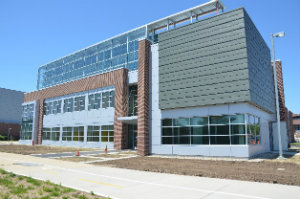
The faculty members of Architectural Engineering are dedicated to research and teaching, with focus on Building Science and design/operation of energy-efficient buildings. Specific topics of research include: thermal and visual comfort, indoor air quality and ventilation, innovative building envelopes, daylighting and electric lighting design & control, energy-efficient equipment, HVAC system design and control, smart buildings, passive/active solar energy technologies, building energy modeling and simulation, and sustainable/green building design.
Architectural Engineering faculty are associated with the Ray W. Herrick Labs. Together with the HVAC Group in ME, we have one of the largest teams in the US conducting research related to the built environment.
The Architectural Engineering group has unique, state-of-the-art facilities to study building performance in terms of energy and indoor environmental quality. These include several room-scale facilities at the Architectural Engineering Laboratories, located at the Bowen Lab, as well as whole building-scale facilities at the Center for High Performance Buildings, located in Herrick Labs.
Spotlights
February 27, 2024
A new study led by Purdue University Civil Engineering Prof. Brandon Boor found that cooking on a gas stove can emit more nano-sized particles into the air than vehicles that run on gas or diesel, possibly increasing your risk of developing asthma or other respiratory illnesses
November 29, 2023
Panagiota Karava, professor in the Lyles School of Civil Engineering, leads a multidisciplinary research team that has developed MySmartE, an eco-feedback and gaming platform for residential energy management.
November 16, 2023
The average morning routine for many Americans includes inhaling several milligrams of chemicals that may be harmful to their health, Purdue University researchers have found.
November 15, 2023
Michael Kim (Ph.D. 2021) started as tenure-track assistant professor in Architectural Engineering at Chung-Ang University, South Korea in September 2023.
August 3, 2023
A research project led by CE faculty Brandon Boor and Nusrat Jung which seeks to monitor and reduce indoor air pollutant exposures in classrooms has received $24,000 in funding from the U.S. EPA as part of the Agency's People, Prosperity, and the Planet (P3) Program.
July 3, 2023
Dr. Ming Qu, professor of civil engineering, has been selected as a Fulbright U.S. Scholar for 2023-2024 in Japan. The Fulbright Scholar Awards are highly competitive and prestigious fellowships that provide unique opportunities for scholars to teach, conduct research, and carry out professional projects worldwide.
May 11, 2023
Civil Engineering Ph.D. student Jinglin Jiang has received a 2023-2024 ASHRAE (American Society of Heating, Refrigeration, and Air-Conditioning Engineers) Grant-in-Aid Award, a $10,000 award given to outstanding graduate students conducting research in High Performance Buildings or HVAC fields.
May 9, 2023
Civil Engineering Ph.D. student Satya Sundar Patra has received a 2023-2024 ASHRAE (American Society of Heating, Refrigeration, and Air-Conditioning Engineers) Grant-in-Aid Award, a $10,000 award given to outstanding graduate students conducting research in High Performance Buildings or HVAC fields.
January 19, 2023
Thanos Tzempelikos, Professor of Civil Engineering, has been appointed as one of the Editors of Building & Environment journal. Building & Environment is the premier international Elsevier journal related to building science, urban physics, and human interaction with the indoor and outdoor built environment, with an impact factor of 7.09.
October 3, 2022
With today’s “smart” homes, you can activate lights and air-conditioning with a simple verbal request. But are these systems really “smart” enough to know which room you’re in? Can they save energy by cooling just one specific corner of the room? That’s the idea behind the Human Building Interactions Laboratory (HBIL), a first-of-its-kind interactive facility at Purdue University that will enable HVAC systems to become truly reconfigurable, right down to the specific wall panels.
September 9, 2022
A multidisciplinary research team led by Panagiota Karava, the Jack and Kay Hockema Professor of Civil Engineering, recently received a $400,000 supplement from the National Science Foundation (NSF) to further its work on “Sociotechnical Systems to Enable Smart and Connected Energy-Aware Residential Communities.” This award builds on an initial $3.5 million award in 2018.
March 9, 2022
A new study, co-authored by Assistant Professor Brandon Boor, shows how surface cleaning using commercial disinfectants can generate secondary indoor pollutants affecting indoor air quality and health, especially for workers repeatedly exposed to disinfectants.
March 4, 2022
PhD student Danielle Wagner has been selected as one of four Purdue Engineering Dean's Teaching Fellows for 2022. Graduate students selected for the program embody a strong commitment to mentoring, service and outreach.
October 22, 2021
Dr. Seungjae Lee (Ph.D. '19) started as a tenure-track assistant professor in the Department of Civil & Mineral Engineering at the University of Toronto (ranked in the top 10 engineering schools worldwide) in July 2021. Seungjae completed his PhD in the Architectural Engineering emphasis area of Civil Engineering. He was advised by Prof. Thanos Tzempelikos and Prof. Panagiota Karava. In 2020-2021 he was a post-doctoral fellow at the Oak Ridge National Laboratory.
August 20, 2021
A Purdue research team led by Panagiota Karava, Jack and Kay Hockema Professor in Civil Engineering, has received a grant of nearly $1 million from the National Science Foundation to develop cyber-physical systems (CPS) aimed at reducing the energy consumption of buildings.
February 2, 2021
Thanos Tzempelikos, Professor in the Lyles School of Civil Engineering and Ray W. Herrick Labs, has been awarded the prestigious Leon Gaster Award from the Society of Light and Lighting as a co-author of the paper, "Cross-validation and robustness of daylight glare metrics," published in the esteemed journal Lighting Research and Technology in November 2019.
September 21, 2020
At just 192 square feet, Purdue University's newest civil engineering laboratory is remarkably small for a research space. Yet, Purdue professor Nusrat Jung has big plans for it. The laboratory comes in the form of a tiny house, called zEDGE, that Jung and a team of students designed and engineered for testing the energy efficiency of large structures on a small scale. Built on a trailer for easy mobility, zEDGE (pronounced "zee-edge") is stationed outside Hampton Hall on Purdue’s West Lafayette campus.
November 15, 2019
Many Nandi homes, like other traditional Kenyan communities, cook using biomass fuels like wood and agricultural wastes in inadequately ventilated kitchens. The women and children who spend more time in these kitchens suffer the most from the effects of indoor air pollution, which is linked to many respiratory illnesses and deaths. The Nandi-improved kitchens were designed jointly with women from Nandi and with the help of the Purdue University Global Air Quality Trekkers (GAQT) engineering team led by Professor Brandon Boor and Ph.D student Danielle Wagner.
October 4, 2019
Just by breathing or wearing deodorant, you have more influence over your office space than you might think, a growing body of evidence shows. But could these basic acts of existence also be polluting the air in the office room where you work? To find out, a team of engineers led by Assistant Professor Brandon Boor has been conducting one of the largest studies of its kind in the office spaces of a building rigged with thousands of sensors. The goal is to identify all types of indoor air contaminants and recommend ways to control them through how a building is designed and operated.
May 24, 2019
Civil Engineering Ph.D. student Danielle Wagner has received a 2019-2020 ASHRAE (American Society of Heating, Refrigeration, and Air-Conditioning Engineers) Grant-in-Aid Award. Recipients are chosen on the basis of the scope of their research, as well as involvement in local ASHRAE chapters and related activities.



